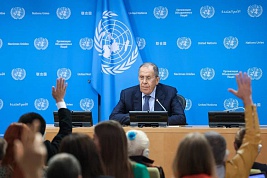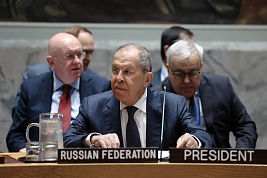MFA Spokesman Andrei Nesterenko Interview to RIA Novosti on the Upcoming Visit to Moscow by Guido Westerwelle, the Vice Chancellor and Foreign Minister of Germany
Question: The Vice Chancellor and Foreign Minister of Germany, Guido Westerwelle, will visit Moscow next week. What is the program of the visit?
Answer: At the invitation of Russian Foreign Minister Sergey Lavrov, the Vice Chancellor and Foreign Minister of the Federal Republic of Germany, Guido Westerwelle, will make a working visit to Moscow on November 1-2. The program of his stay also envisions a conversation of the First Deputy Prime Minister, Igor Shuvalov, with the deputy head of the Government and head of the foreign affairs agency of Germany.
Question: How in this context could you assess the current state of and prospects for Russian-German relations?
Answer: Russian-German relations are developing in an ongoing and dynamic manner in all areas of our strategic partnership. This year the Russian President and the German Chancellor have met on different "platforms" six times. Milestones reflecting the two countries' traversed path of mutual rapprochement were the memorable dates of Russian history celebrated in 2010: the 65th anniversary of the Victory and the defeat of Nazism, the 55th anniversary of the establishment of diplomatic relations, the 20th anniversary of the Treaty on the Final Settlement with Respect to Germany, and the 20th anniversary of the unification of Germany. The magnitude, depth and ramification of bilateral relationships were convincingly confirmed by the state visit to the Russian Federation on October 11-15 this year by the Federal President of Germany Christian Wulff, which has given extra impetus to the project work being carried out in areas such as historic reconciliation, cultural and humanitarian cooperation, exhibition and youth exchanges, inter-university partnerships, inter-regional ties, including the sister cities movement, and the dialogue of civil societies.
Question: What is the agenda of the upcoming Russian-German talks?
Answer: In the framework of the Russian-German talks it is planned to exchange views on the progress made in carrying out the agreements reached at the 12th round of Russian-German interstate consultations at the highest level held in Yekaterinburg under the chairmanship of Russian President Dmitry Medvedev and German Chancellor Angela Merkel on July 14-15 this year. A fundamentally important priority in this regard is to expand cooperation in the Russian-German Partnership for Modernization strategy format that has well acquitted itself. Attention will also be devoted to the prospects of economic and commercial cooperation, to the measures to put it on an innovative path of development, and to the advancement of landmark investment projects and the process of the formation of modernization alliances between Russian and German companies, especially in high technology fields.
Question: What problems are going to be discussed in the upcoming talks between the Russian and German foreign ministers?
Answer: The Russian and German foreign ministers will focus on an in-depth exchange of views on a wide range of topical issues of the international and bilateral agenda. Subject to the provisions of the Joint Statement issued at the summit of the leaders of Russia, Germany and France in Deauville on October 18-19, the main attention will be paid to the harmonization of approaches concerning the content filling of the upcoming multilateral meetings involving the Russian President and the German Chancellor, including the G20 Summit in Seoul, the Russia-NATO Council meeting at the highest level in Lisbon and the OSCE summit in Astana. The agenda will include such priority issues for the parties as renewal of the Euro-Atlantic security architecture; the settlement and prevention of regional conflicts; disarmament and WMD nonproliferation; combating international terrorism and other common challenges and threats; ensuring strategic stability, including aspects of the movement toward a "global nuclear zero"; missile defense problems, and the relationship and sequence of steps in the domain of arms control and limitation.
In light of the initiative to establish a ministerial-level Russia-EU Committee on foreign and security policy, put forward by President Medvedev and Chancellor Merkel after the Russian-German summit in Mezeberge on June 4-5 this year, discussion will touch upon further steps toward its practical realization as a key mechanism for cooperation within the framework of relations between Russia and the EU.
Taking into account Germany's election to the UN Security Council as a nonpermanent member for the period 2011-2012 and the overall high level of cooperation between Russia and Germany in the UN framework, the ministers will discuss the possibility of its deepening on the basis of shared positions on many topical issues on the agenda of the world Organization and with the common understanding of the need to strengthen its leading role in international affairs.
The ministers will consider a number of practical issues concerning, in particular, the expansion of the treaty and institutional base for cooperation between the two countries in the humanitarian and legal fields, including the progress of preparation of the draft bilateral agreements on the activities of cultural and information centers, the work of experts on which has considerably advanced and is close to a successful conclusion. An important topic for substantive discussion is further reciprocal facilitation of visa issuance practice and generally the promotion of a Russia-EU visa-free dialogue
Question: What else is envisioned by the program of Westerwelle's stay in Russia?
Answer: The head of the foreign affairs agency of Germany is scheduled to meet with the adviser to the President of the Russian Federation, co-chair of the Russian Association of Lawyers Veniamin Yakovlev and members of the Association.


